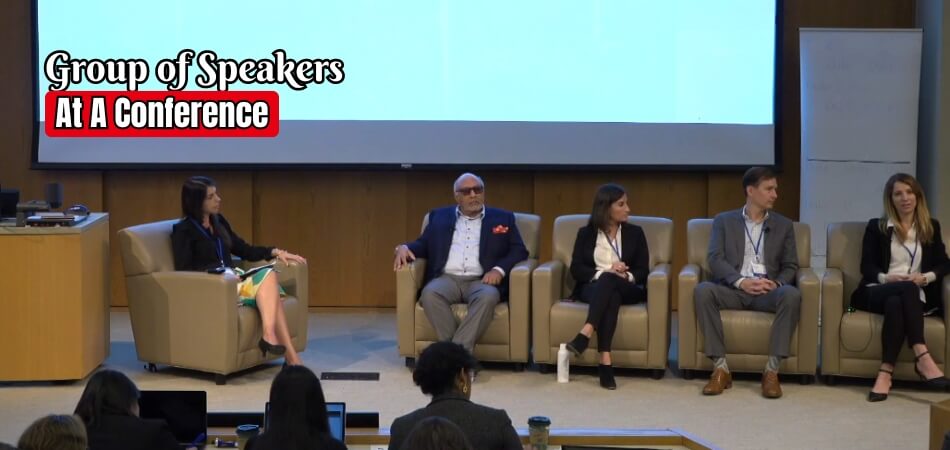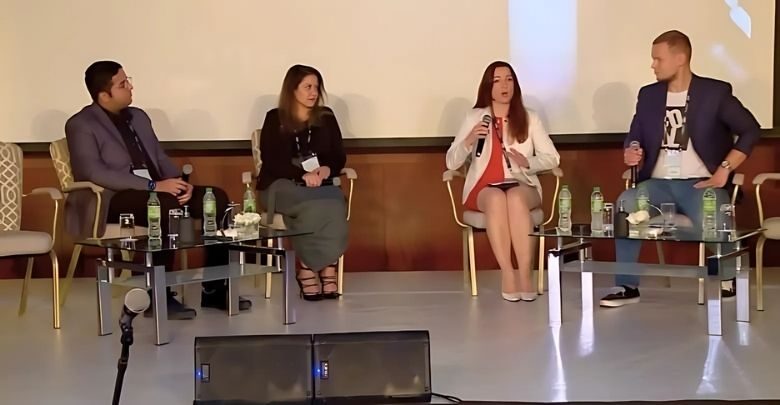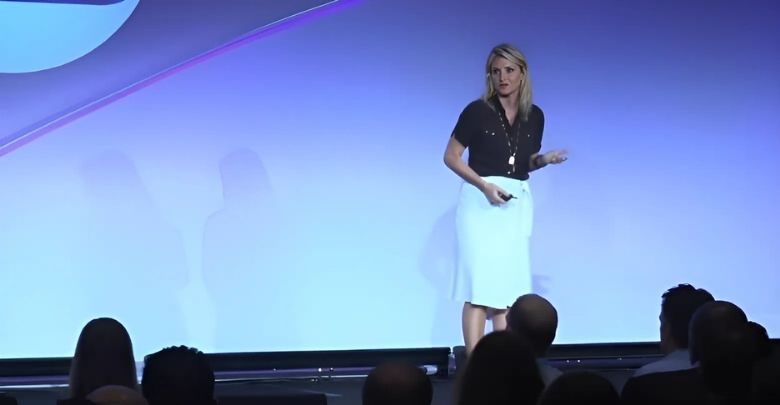Most conferences and professional gatherings are made memorable by the line-up of speakers. Participants are excited to hear from experts, learn about new trends, and engage in discussions on relevant topics. But what is a group of speakers at a conference called?
A group of speakers at a conference is called a “panel” or “panel of speakers.” This group typically engages in active discussions, shares valuable insights, and takes questions from the audience. These sessions are moderated by an experienced moderator who creates a structured but lively environment for the audience.
Throughout this article, we will explore how panel discussions are organized, their impact on successful conferences, and their unique role.
Roles of Speakers at A Conference
Speakers at conferences bring fresh insights, adding value by sharing experiences, ideas, and expertise on various topics. They help create an interactive environment, allowing attendees to ask questions and gain clarity. By doing so, they bridge knowledge gaps, making complex subjects more accessible and engaging.
Each speaker typically holds a specific role, such as presenting, moderating, or joining a discussion panel. Presenters deliver prepared talks, diving deeply into specialized areas or groundbreaking research. Moderators guide conversations, ensuring discussions remain productive and on-topic while allowing every voice to be heard.
Panelists offer diverse perspectives, enriching discussions by debating key points and sharing contrasting opinions. Their insights add depth to conversations, making sessions more engaging and thought-provoking. With the growing demand for knowledge-sharing, international conferences play a big role, as these event often bring together experts from different backgrounds, creating diverse discussions. Many well-organized events, like conferences in Canada, for example, attract experienced speakers who contribute valuable expertise, making these gatherings beneficial for attendees.
What is a Group of Speakers at a Conference Called?
A group of speakers at a conference is commonly referred to as a “panel” or “panel of speakers.” Panels consist of experts or professionals who share knowledge, insights, and experiences on various topics. They engage with the audience, answer questions, and provide a deeper knowledge of the subject matter. Panels offer a valuable experience by bringing multiple perspectives to the forefront, making discussions more informative.

Each panel is often led by a moderator who guides the conversation and ensures it stays on track. The moderator introduces speakers, poses questions, and helps facilitate a smooth discussion flow. This role is essential for maintaining structure and allowing each panelist to contribute. By creating a balanced environment, moderators make the session enjoyable and educational.
Panelists typically share their viewpoints on specific topics, encouraging an open and thought-provoking exchange of ideas. Their discussions can spark further conversations among the audience, enhancing the overall learning experience. Conference attendees benefit from these sessions, gaining insights that can be applied to their work. Through engaging discussion, panels turn a typical presentation into an interactive learning moment.
Different Types of Speaker Groups You’ll Find at a Conference
Conferences host various speaker groups, each adding unique value to the attendee experience. Knowing these groups can help participants engage more meaningfully with content. Listed below are the different types of speaker groups you’ll see at conferences.
Keynote Speakers
Keynote speakers open or close conferences, setting the event’s tone. They typically share impactful stories or insights related to the theme. Their purpose is to inspire and engage the audience from the start. Keynotes often feature industry leaders or respected experts to make a lasting impression.
Panel Discussions
Panel discussions bring together multiple experts to share insights on a specific topic. A moderator guides these discussions to maintain a focused and interactive session.
Often, panelists hold different viewpoints, creating an interesting and dynamic discussion. It is beneficial for audiences to hear diverse perspectives and solutions to critical issues.
Workshop Facilitators
Workshop facilitators lead hands-on sessions for deeper learning on specialized topics. They encourage participant interaction, making the learning experience more engaging and practical. These sessions often include exercises, case studies, and real-world applications. Facilitators focus on skill-building, leaving attendees with practical takeaways.
Breakout Session Leaders
Breakout session leaders guide smaller, focused discussions on niche subjects within the conference. These sessions allow for more personalized interaction between speakers and attendees. Leaders encourage questions and participation, creating an intimate learning environment. It helps attendees gain a deeper knowledge of a particular topic.
Roundtable Moderators
Roundtable moderators manage open discussions where everyone can share insights and ask questions. Moderators keep conversations balanced, ensuring everyone has a chance to speak. Roundtables promote peer learning, encouraging attendees to learn from each other’s experiences. These sessions are ideal for networking and collaborative problem-solving.
How to Connect with a Conference Speaker?
Building connections with conference speakers can expand your knowledge and broaden your network. Many attendees feel unsure about approaching speakers, but taking thoughtful steps can make a positive impact. Here’s guidance on how to connect meaningfully with a conference speaker:
Step 1: Research the Speaker in Advance
Find out more about the speaker’s background and work before the conference. Knowing their area of expertise helps in asking relevant questions. This preparation shows genuine interest and makes interactions more impactful. Look for recent projects, articles, or interviews they’ve been part of.
Step 2: Prepare Thoughtful Questions
Prepare insightful questions related to the speaker’s talk or area of expertise. Avoid generic questions; instead, focus on specific topics they’ve addressed. Asking well-thought-out questions shows respect for their time and knowledge. This approach often leads to more engaging and meaningful conversations.
Step 3: Attend Their Sessions Early
Arriving early allows you to get your spot and possibly introduce yourself. Attending the event early shows interest and dedication. Speakers may remember those who attend sessions attentively. This sets a foundation for a friendly follow-up conversation afterward.
Step 4: Engage During Q&A Sessions
Participating in Q&A sessions gives you the chance to interact in a public setting. Frame your question respectfully and keep it relevant to the discussion. Public engagement helps the speaker recognize you, especially if it’s a memorable question. It can be easier to connect later if you do this.
Step 5: Follow Up with a Personalized Message
After the conference, reach out with a message mentioning specific points from their talk. A personalized note shows you paid attention and value their insights. Expressing gratitude for their time can leave a lasting impression. Use email or professional networks like LinkedIn to connect.
Step 6: Stay Connected
Participate in their social media activities to maintain the relationship. Share their posts or comments thoughtfully to maintain visibility. Attend their future presentations or workshops to show ongoing interest. These ways to connect with conference speakers can lead to lasting professional relationships.
Why Does the Grouping of Speakers Matter?
Presentations are more engaging, effective, and enjoyable when speakers are grouped at conferences. By organizing speakers thoughtfully, conferences ensure audiences receive broad, well-rounded insights. Here’s why the grouping of speakers truly matters:
- Better Topic Coverage: When speakers are grouped, a variety of viewpoints are shared. This diversity provides audiences with a balanced view and helps to keep discussions on track.
- Encourages Dynamic Conversations: When speakers are grouped thoughtfully, they can interact naturally, sparking engaging discussions. This interaction contributes to the audience’s experience, making the sessions more memorable.
- Improves Audience Engagement: Grouped speakers create a balanced environment where questions and answers are more dynamic. Engaged audiences are more likely to retain information and participate actively.
- Balances Expertise Levels: Mixing speakers with varying expertise levels ensures both foundational and advanced insights are covered. It allows attendees to meet a broad audience, which benefits everyone.
- Fosters Collaborative Learning: It is beneficial to group speakers from different fields in order to encourage multidisciplinary learning and collaboration. Audiences can discover innovative ideas that arise from these blended perspectives.
- Promotes Networking Opportunities: Grouped speakers allow attendees to interact with multiple experts within a single session. This setup facilitates networking and professional growth among attendees and speakers.
- Supports Structured Discussions: By grouping speakers, it is easier to keep the conversation on track within a limited time frame. Structured discussions provide clarity, ensuring all speakers have an opportunity to contribute.
- Adds Value to the Event: A well-grouped speaker panel contributes to the event’s perceived value by showcasing expert voices on relevant topics. This structure leaves a positive, lasting impression on attendees.
Is it Possible to Speak at a Reputable Conference?
Yes, it is possible to speak at a reputable conference with the right preparation and effort. Many conferences welcome new voices, especially those offering fresh perspectives and expertise. By researching conferences aligned with your field, you can find potential speaking opportunities.
Building a strong professional profile helps increase your chances of being selected as a speaker. Sharing knowledge through blogs, articles, or social media showcases your expertise and insights. Networking within industry circles also plays a key role in securing speaking engagements at conferences.
When aiming to secure a spot, finding opportunities to speak at conferences often requires a proactive approach. Expressing genuine interest and presenting your topics can make you a compelling candidate. With persistence and dedication, you can successfully secure a speaking role at reputable events.
FAQs About What is a Group of Speakers at a Conference Called?
Many questions arise when attending or organizing conferences, especially around speaker groupings, formats, and roles. Speaker panels can be insightful if you know how they work, who moderates them, and how they enhance the event experience. Here are some frequently asked questions about speaker groups at conferences to help clarify this topic further:
Can Anyone Be a Part of a Conference Speaker Panel?
Typically, speaker panels consist of individuals with relevant expertise or professional backgrounds in the conference theme. However, some conferences accept new voices who offer fresh perspectives, provided they demonstrate knowledge, experience, or research in the area.
What Qualities Make a Good Panelist?
A good panelist communicates clearly, respects other perspectives, and shares insightful, relevant information. They bring expertise to the table and contribute to dynamic conversations by offering informed opinions and engaging in meaningful dialogue with both the audience and other panellists.
How Do Panel Discussions Differ from Keynote Speeches?
Keynote speeches are usually solo presentations focused on inspiring or introducing ideas, while panels are group discussions. Panels offer multiple viewpoints on a topic, creating a more interactive, multifaceted session compared to the one-way communication of a keynote.
Can Virtual Conferences Host Effective Panel Discussions?
Yes, virtual conferences often include panel discussions with tools for live Q&A and audience interaction. Virtual panels allow speakers from different locations to connect, creating engaging discussions that are accessible to a global audience.
What Should Audience Members Expect from a Panel Discussion?
Audience members can expect an engaging discussion where experts share insights and debate viewpoints on a relevant topic. Panels often include a Q&A segment, allowing attendees to ask questions, making the session interactive and informative.
Bottom Line
Conferences often feature groups of speakers who contribute to the event by providing diverse perspectives and encouraging valuable discussions. These groups, referred to as “panels,” include speakers who present insights, share expertise, and engage audiences through structured, moderated sessions.
By knowing what is a group of speakers at a conference called, attendees can have a better knowledge of panel organization, speaker roles, and how they affect conference dynamics. From keynote speeches to interactive roundtable sessions, each type of speaker group adds its value, improving the learning experience and creating networking opportunities.







